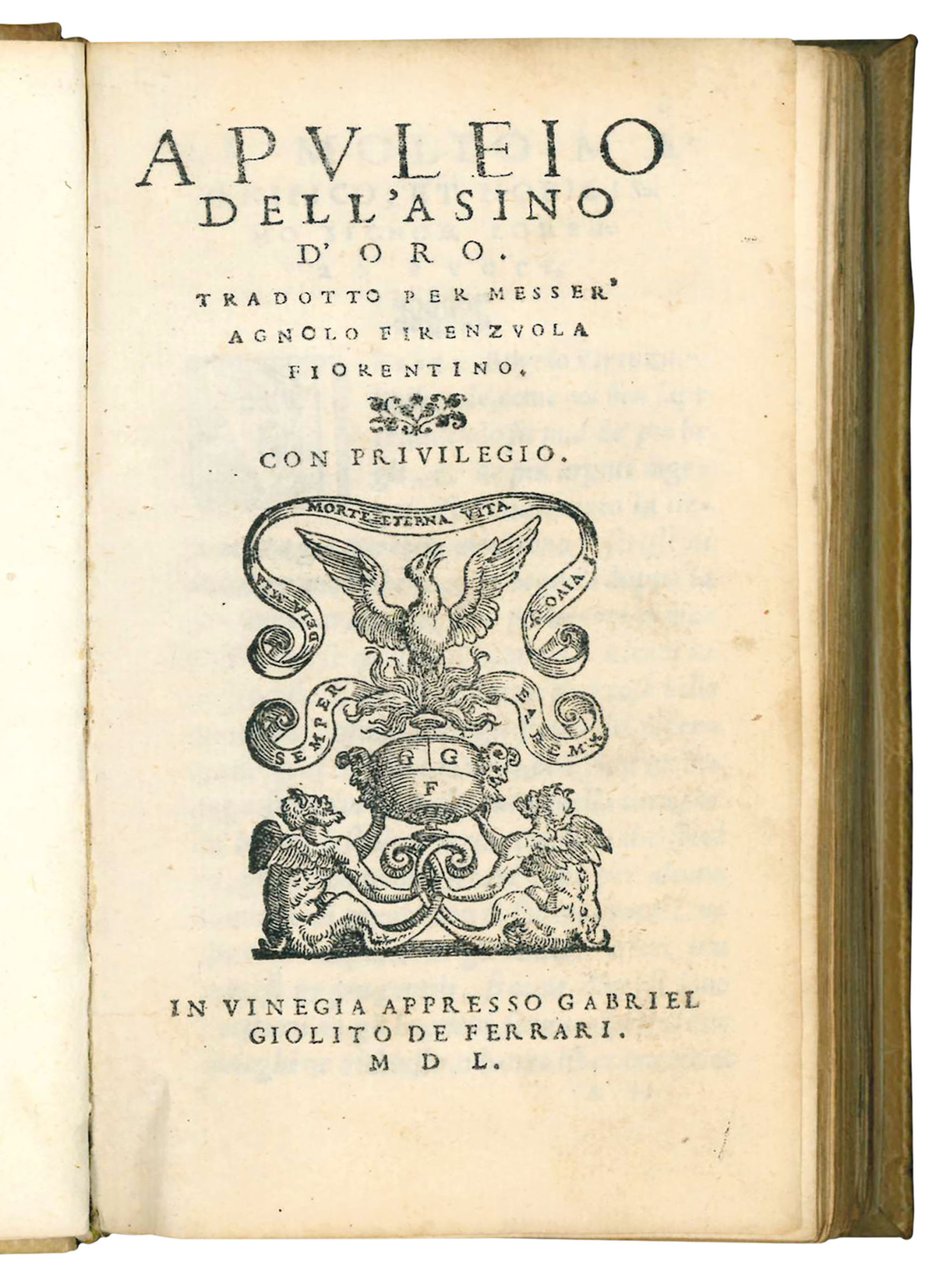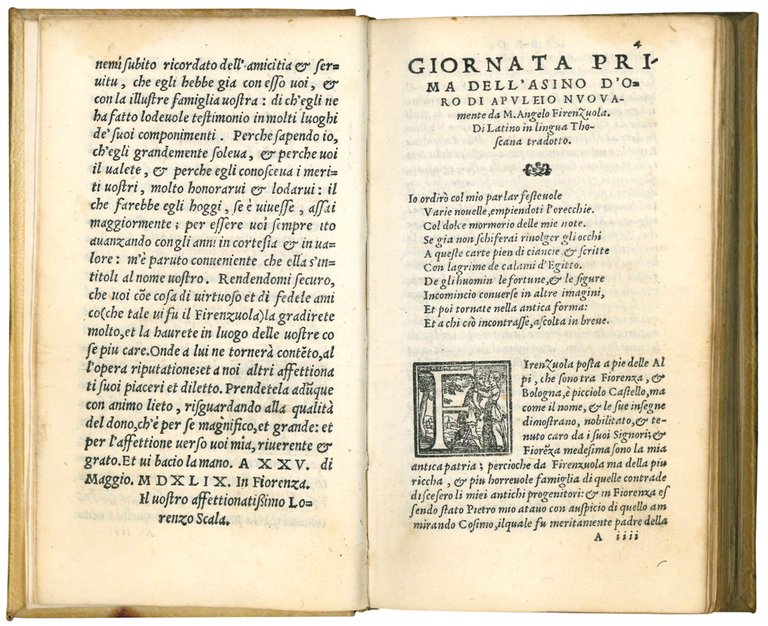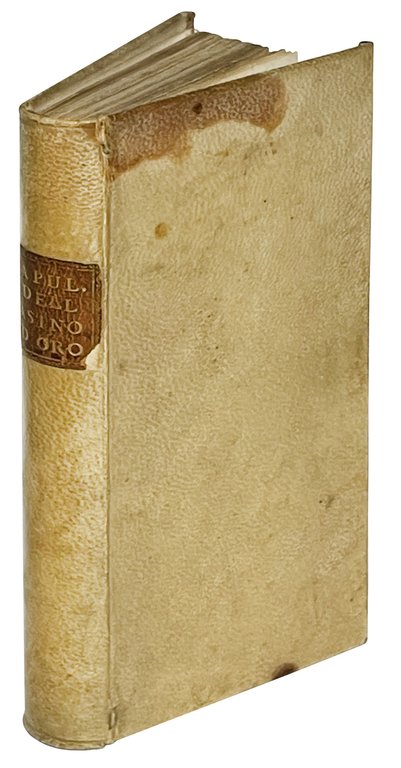


Libros antiguos y modernos
APULEIUS (125-180)-FIRENZUOLA, Agnolo (1493 ca.-1545)
Apuleio Dell'asino d'oro. Tradotto per Messer' Agnolo Firenzuola fiorentino
Gabriel Giolito de'' Ferrari, 1550
2500,00 €
Govi Libreria Antiquaria
(Modena, Italia)
Los gastos de envío correctos se calculan una vez añadida la dirección de envío durante la creación del pedido. El vendedor puede elegir uno o varios métodos de envío: standard, express, economy o in store pick-up.
Condiciones de envío de la Librería:
Para los productos con un precio superior a 300 euros, es posible solicitar un plan de pago a plazos al Maremagnum. El pago puede efectuarse con Carta del Docente, Carta della cultura giovani e del merito, Administración Pública.
Los plazos de entrega se estiman en función de los plazos de envío de la librería y del transportista. En caso de retención aduanera, pueden producirse retrasos en la entrega. Los posibles gastos de aduana corren a cargo del destinatario.
Pulsa para saber másFormas de Pago
- PayPal
- Tarjeta de crédito
- Transferencia Bancaria
-
-
Descubre cómo utilizar
tu Carta del Docente -
Descubre cómo utilizar
tu Carta della cultura giovani e del merito
Detalles
Descripción
First edition of the Italian adaptation by Agnolo Firenzuola of Apuleius' Golden Ass. Firenzuola's is overall the second Italian version of the work after that of Matteo Maria Boiardo (ca 1441-1494), which appeared at Venice in 1518 with the title Apulegio volgare.
All of Firenzuola's works, with the exception of the Discacciamento de le lettere inutilmente aggiunte ne la lingua toscana (‘Expulsion of the letters unnecessarily added to the Tuscan language') published at Rome in 1524, were edited posthumously by his brother Girolamo, who entrusted Lorenzo Scala and Lodovico Domenichi with the publication of Agnolo's papers: the Prose and the Rime appeared at Florence in 1548 and 1549; the comedies I Lucidi and Trinunzia at Florence in 1549; and the Asino d'oro, the only one not printed by Giunta in Florence, in 1550.
As stated by Scala in the dedication of the present edition to Lorenzo Pucci, dated from Florence, 25 May 1549, the manuscript of the translation that he found among Firenzuola's papers was deficient and was therefore completed by Domenichi in a style that perfectly imitated that of Firenzuola.
Agnolo Firenzuola, a native of Florence, followed in the footsteps of his father, a notary, and studied law in Siena and Perugia, where he met Claudio Tolomei and Pietro Aretino. After graduating, he took the holy habit in Vallombrosa and moved to Rome in 1518, where he became procurator of the Order at the Curia. In Rome he formed a literary circle with his friends from Siena and Arezzo, and made the acquaintance of P. Bembo, A. Caro and G. Della Casa. In 1526 he was dispensed from his vows and contracted syphilis, a disease that plagued him for a long time. The main reason for his decision to give up the habit was his meeting with a refined Roman noblewoman, the wife of a lawyer, whom Firenzuola praised in many of his works under the pseudonym of Costanza Amaretta. In 1538 he moved to Prato, where he founded the Accademia dell'Addiaccio and embraced again the monastic life, becoming abbot of the Monastery of San Salvatore. In the last years of his life, he was involved in a legal dispute with his sister over their father's inheritance and other quarrels (cf. F. Pignatti, Firenzuola, Agnolo, in: “Dizionario biografico degli Italiani”, Rome, 1997, vol. 48, s.v.).
Edit 16, CNCE2239; S. Bongi, Annali di Gabriele Giolito de' Ferrari, Rome, 1890, I, pp. 273-276; F. Federici, Degli scrittori latini e delle italiane versioni delle loro opere, Padua, 1860, pp. 141-142; F.L.A. Schweiger, Bibliographisches Lexicon der gesamten Literatur der Römer, Amsterdam, 1962, I, pp. 14-15.

